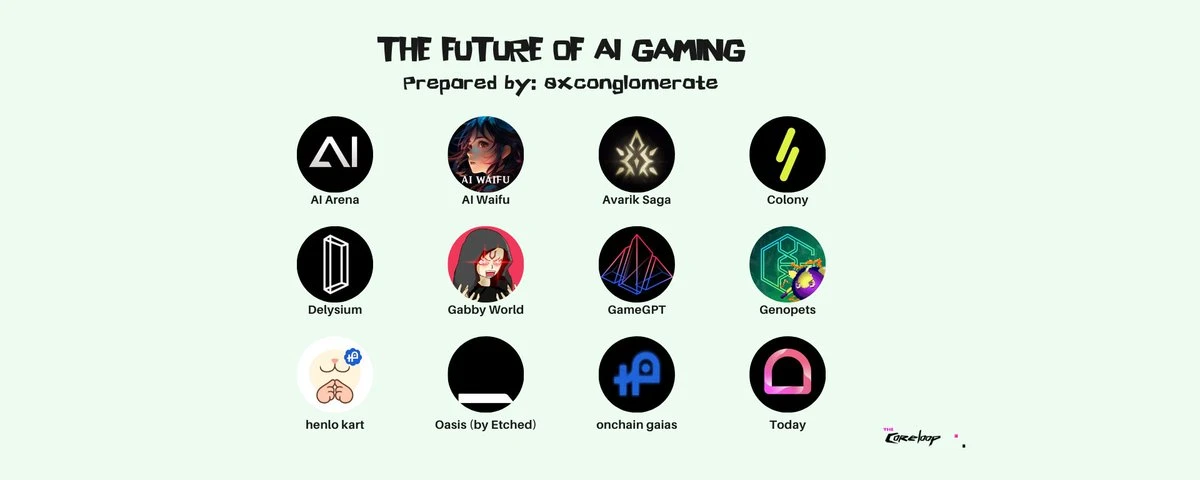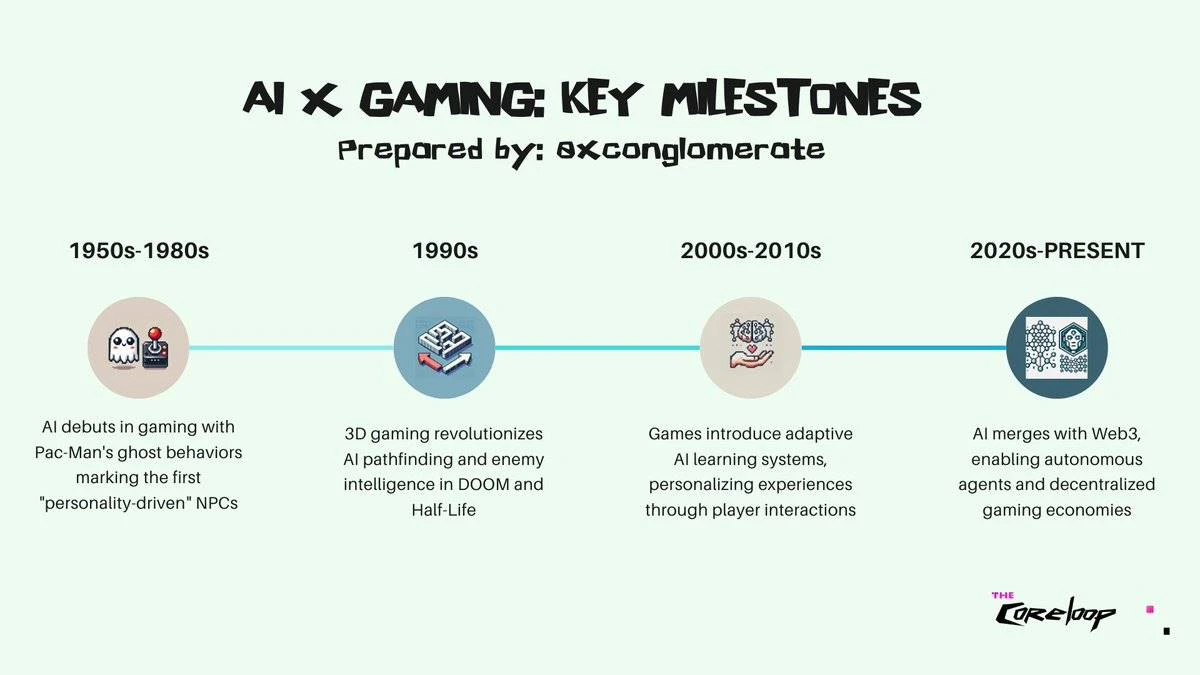原作者: Conglomerate | thecoreloop
原文翻訳: TechFlow
AI is a hot topic in 暗号 right now, but its integration with Web3 games is still in its infancy. After hours of research, I found areas where real value could be generated. Here are my main findings
Topic Overview
-
A brief history of AI and games
-
How Web2 gaming companies are currently leveraging AI
-
The next chapter in AI gaming: From Web2 to Web3
-
AI and Web3 Game Projects
-
Key trends in AI and Web3 gaming
A brief history of AI and games
Games have long been an ideal testing ground for artificial intelligence. Their unique responsiveness, ever-changing objectives, and real-time environments make them an ideal environment for advancing AI technology. Early AI development faced significant obstacles and required preset rules or simplified environments to function. However, these limitations gave rise to creative solutions, and games became the perfect stage for progress.
2015 marked a significant moment: an AI agent mastered 49 Atari games using only pixels and scores, reaching professional human-level performance. This breakthrough proved that AI can learn naturally in complex environments and laid the foundation for today’s AI revolution.
From Arcade AI to Autonomous Agents: Games move from simple computer opponents to self-learning characters owned by players in the Web3 era.
How Web2 gaming companies are currently using AI
Building on these foundations, leading gaming companies are implementing AI technology in innovative ways.
-
Roblox (announced in February 2023): revolutionized user-generated content (UGC) in games by integrating generative AI, helping 58.8 million daily active users create 3D models and code with simple prompts.
-
Sony AI (announced in November 2019): Focuses on basic AI research to improve Sonys gaming business.
-
King (active since 2017): Pioneering use of AI in game development through its AI Lab, particularly the use of game testing bots, which reduced manual level adjustments in Candy Crush Saga by 95% and increased development speed by 50%.
The next chapter of AI gaming: From Web2 to Web3
AI has already demonstrated its transformative value in gaming, reshaping the way games are built, played, and experienced. While Web2 giants continue to innovate, the crypto gaming space remains underdeveloped, providing an enticing opportunity for AI-driven advancements.
In the following sections, we’ll explore some of the pioneering projects leading this revolution, bringing together AI and Web3 to reデフィne the future of gaming.
AI and Web3 Game Projects
-
Through imitation learning, players can train AI-powered NFT warriors and analyze and improve character performance through the AI Inspector tool to prepare for automated PvP battles.
AI Waifu // @aiwaifugg // $WAI
-
A fantasy character platform with AI-powered personalized dialogue, comic generation, and voice interaction, covering hundreds of community-created characters and scenarios.
Avarik Saga // @avariksaga // $AVRK
-
Mobile RPG game, AI-driven demigods interact with players both in-game and on popular messaging apps through conversations driven by large language models.
Colony // @ParallelColony // $PRIME
-
An AI-driven strategic survival simulation where AI agents, called avatars, continuously learn from their surroundings.
Delysium // @The_Delysium // $AGI
-
What started out as a battle royale MMORPG with AI virtual creatures; now building Lucy, an AI-powered Web3 operating system, on the YKILY network.
Gabby World // @gabby_world_ // $GABBY
-
It’s the first fully autonomous AI world where all elements — from characters to storylines — are generated on-chain through user-created prompts.
-
Read: Reintroducing Gabby World: The First AIGC Autonomous World
GameGPT // @Gamegptofficial // $DUEL
-
Provides an AI-powered game builder that empowers creators for rapid, collaborative game development, democratizing the creative process and unlocking immersive experiences at unprecedented speed.
-
It’s a “move to earn” game where every step provides energy to an AI-driven digital pet, converting physical activity into game progress and valuable AI training data.
henlo kart // @henlokart // n/a
-
Hamster Racing Game launched by the Onchain General Intelligence (OGI) network, a decentralized platform that supports the creation, training, and deployment of open, decentralized AI agents.
Oasis // @Etched // n/a
-
The first fully AI-generated game world where players can explore, build and destroy an endless variety of procedural environments, driven by advanced AI rendering technology.
onchain gaias // @onchaingaias // n/a
-
General Artificial Intelligence Agents (GAIAs) bring decentralized, player-trained AI agents to games, allowing users to shape, train, and benefit from the agents in a community-driven ecosystem.
Today// @todaythegame // n/a
-
A social simulation game where AI-driven island residents create unique, personalized interactions and drive a player-owned virtual economy.
Note: This overview is based on current research and represents only a selection of AI and Web3 gaming projects. It is not comprehensive. The information provided is for educational purposes only and should not be considered financial advice.
結論
AI and Web3 are fundamentally reshaping the gaming landscape, bringing personalized experiences to players and enabling them to actively shape virtual worlds. We are moving beyond basic AI capabilities into fully autonomous environments where every player decision has an impact, transforming players from passive consumers to empowered participants.
Projects like AI Waifu and Today are more than just entertainment platforms; they are evolving into social ecosystems where AI-powered characters create deeply personal connections and drive player-owned economies. The integration of AI training through gaming, as seen in Genopets and AI Arena, further underscores this shift toward player-centric value creation.
Perhaps most importantly, the combination of AI and Web3 technologies makes game development more accessible than ever before. Projects like GameGPT and Oasis demonstrate how AI tools can break down traditional barriers to creation, allowing anyone to participate in building these new virtual worlds. This shift, coupled with the rise of autonomous AI agents and player-owned data, suggests that we are witnessing the early stages of a gaming revolution in which the lines between players, creators, and AI blur to form a single, dynamic ecosystem.
This article is sourced from the internet: AI agents are becoming popular. Here are 12 Web3 games powered by AI
Original author: Steven Ehrlich, Forbes Original translation: Luffy, Foresight News Blockstream co-founder and CEO Dr. Adam Back is a British cryptographer and computer scientist best known for inventing Hashcash in 1997, which later became the basis for Bitcoins proof-of-work system. As CEO of Blockstream, Back plays a central role in developing infrastructure and scaling solutions that shape the future of Bitcoin finance. Blockstreams major innovations include Liquid Network, Bitcoins first sidechain designed to enable faster, more private transactions, and seamless issuance of digital assets such as stablecoins and tokenized real-world assets (RWA). Back is well known in the crypto community because he interacted with anonymous Bitcoin creator Satoshi Nakamoto before he wrote his seminal white paper in 2008. In this interview, we briefly touch on some of Back鈥檚 early work…









